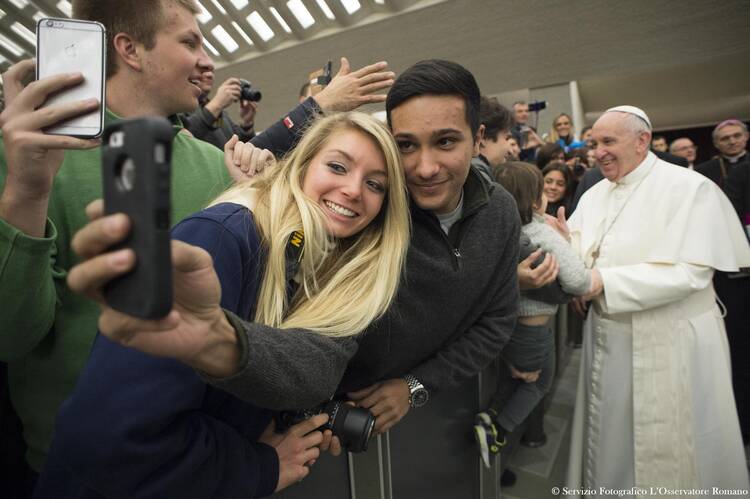I did not come quickly or naturally to social media. I was dragged into it by others, and what social media presence I have on Twitter and Facebook remains inexpert and erratic. So I am in no position to be prescriptive. I also have moments of wondering whether social media is worth the time and effort, whether it might be better to leave it to others who are younger and more adept.
Yet I have come to think that social media is not an optional extra, but rather a central part of the church’s mission now. The blog that I wrote throughout the 2015 Synod—not my idea—convinced me of this. Social media became an unexpectedly integral part of the Synod for me, personally, and for many others, because it included them and helped me see more of what synodality means. Thinking ahead, social media will be integral to the Plenary Council that the church in Australia will celebrate in 2020, as it will to any future Ecumenical Council.
But can social media help us communicate beyond the church or beyond the “network bubble” in which we may be caught? I think so, though I am not altogether sure. Certainly, we have to find ways of speaking to those outside our community of agreement—not just through new media but in new ways. At times we pour old wine into new wineskins, but we need new wine in new wineskins. That means, I think, that as we enter social media we need to be (at the very least) demotic, surprising and positive.
Social media is not monolithic. Platforms such as Facebook and Twitter incorporate a variety of subcultures that have to be understood, and this presumes a new kind of dialogue. Social media can be a Wild West where anything goes, a world where people like bishops are simply one among many voices. This world reconfigures teaching authority; it is a world where everything is fluid, where boundaries are blurred and roles are not what they were. The adjustment this requires is part of being missionary today.
At times we can fall into churchy stereotypes, speaking in ways that may seem wondrous to us but which don’t speak to most people. On social media we need to move beyond the stereotypes that have clerics saying predictably edifying things in predictable ways. We have to offer fresh angles not only on issues usually associated with the church but more especially on the call of the Gospel today. We need to be surprising.
Social media can specialize in negativity, but to serve the Gospel will mean being optimistic. That doesn’t mean a Pollyannish approach, nor does it in any way exclude the prophetic. Being positive creates a special place for humor—by which I mean turning an ironic eye on the world in a way that is typical of the Bible. Real humor is the servant of real hope. Positivity will also mean saying no to ideological warfare and knowing when silence is better than speech.
Pope Francis has struck a chord with many people outside of the Catholic Church because he knows how to be colloquial, surprising and positive—not just on social media but in his pastoral style. The pope is markedly present on social media not because he is technologically adept, but because others share his words and deeds for him. This is because he is a pastor and missionary attuned to the very personal encounters that social media can make possible. Pope Francis is showing something of what it means to put new wine in new wineskins. I am still trying.










You're right! It takes bravery and an authentic voice to navigate the social media platform, and you are on the right track. I'll look for you on Facebook and Twitter!